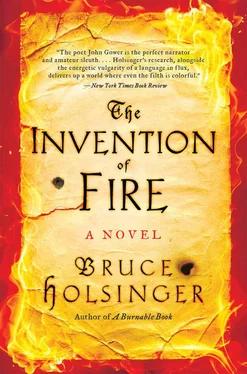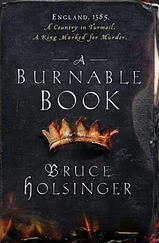Bruce Holsinger - The Invention of Fire
Здесь есть возможность читать онлайн «Bruce Holsinger - The Invention of Fire» — ознакомительный отрывок электронной книги совершенно бесплатно, а после прочтения отрывка купить полную версию. В некоторых случаях можно слушать аудио, скачать через торрент в формате fb2 и присутствует краткое содержание. Год выпуска: 2015, Издательство: HarperCollins, Жанр: Исторический детектив, на английском языке. Описание произведения, (предисловие) а так же отзывы посетителей доступны на портале библиотеки ЛибКат.
- Название:The Invention of Fire
- Автор:
- Издательство:HarperCollins
- Жанр:
- Год:2015
- ISBN:нет данных
- Рейтинг книги:3 / 5. Голосов: 1
-
Избранное:Добавить в избранное
- Отзывы:
-
Ваша оценка:
- 60
- 1
- 2
- 3
- 4
- 5
The Invention of Fire: краткое содержание, описание и аннотация
Предлагаем к чтению аннотацию, описание, краткое содержание или предисловие (зависит от того, что написал сам автор книги «The Invention of Fire»). Если вы не нашли необходимую информацию о книге — напишите в комментариях, мы постараемся отыскать её.
The Invention of Fire — читать онлайн ознакомительный отрывок
Ниже представлен текст книги, разбитый по страницам. Система сохранения места последней прочитанной страницы, позволяет с удобством читать онлайн бесплатно книгу «The Invention of Fire», без необходимости каждый раз заново искать на чём Вы остановились. Поставьте закладку, и сможете в любой момент перейти на страницу, на которой закончили чтение.
Интервал:
Закладка:
Yet no border is impenetrable, no borderland fixed and rigid in the lived experience of its inhabitants and visitors. The region separating England from Scotland is an ever-changing land of mixed allegiances and divided loyalties among the marcher lords and the lesser families who inhabit this frontier. Like their own tangled relations, their lands traverse the wandering course of the Picts’ Wall, that ancient barrier of half-buried stone that snakes across the border, to be met by innumerable roads and byways wending through empty heaths, along hidden valleys, over hills too many to name.
On the first Sunday of Advent, in the fifteenth year of King Robert’s reign and the tenth year of King Richard’s, a woman could be seen leading a horse down along the northern face of one such nameless hill. There was a fierce wind sluicing through the crags on that day, making an already steep and stony descent still more difficult. Yet she kept her footing well, her legs strengthened by long travel and wise experience. Her face had thinned over the last months, gone to gaunt yet still a thing of beauty to anyone looking at her, though there had been few enough of these in recent weeks. She pressed onward and downward, making her slow way north.
She walked alone.
Her horse, led by a thin and fraying rope, stepped along with equal confidence. A slight limp has come on in recent days, worrying her mistress. The mare’s journey from Essex and the south had been long and trying, and like her mistress she had thinned; though like her, too, she was strong, agile, willing to struggle through the minor sufferings of travel with the promise of rest to come. Both knew their journey was nearing its end.
On the mare’s broad back sat a man. He was asleep at the moment, and had been for the better part of two hours, though it was a healing sleep. For weeks, since their flight from Derlinton and the Palatinate, he had been ravaged by fever, closer to death than any man should come and hope to live. His leg had largely healed itself and remained whole, though like the mare he would walk henceforth with a distinctive limp. He was gaining strength by the day, walking slowly for stretches of the path, spelled by the mare when he grew weary.
Within another week they would join her relations on the coast, there to take up residence in a modest house on a bishop’s estate, where they would serve the diocese and manor well. They would live as husband and wife, never taking the sacrament yet fully and properly wedded in the eyes of God. There would be children, four or five in number. They would be content and safe in their adopted home. They would live long, their years blessed with small fortune and great love.
This, at least, is how Chaucer might have ended the story of Robert Faulk and Margery Peveril, these intended victims of an unthinkable violence they together escaped, at least for a time. In my youth I made a pilgrimage to St. Cuthbert’s shrine in Durham, traveling the same overland route traversed by Robert and Margery in their long flight from the Kentish wood and the horror they encountered there. Our company never made it as far as Edinburgh, nor even to the marches, though once in the Palatinate we could taste something of the northern air, imagine ourselves among the green and endless hills of a wild borderlands we knew then only through the minstrels’ songs. Would such songs find Margery and Robert in the end, I wondered, or would their tale fade into the same long and tuneless oblivion that entombs so many bygone lives?
Chaucer is a lusty maker, a sharp-eyed poet of strong endings and firm moral lessons. Tales of learned roosters and cuckolded reeves, jests of broken wind, romances of pricking knights, the brief lives of martyred children and virgin saints. Even his tragedies make for a happy close, and if Geoffrey were to sit down and ink out a quire on the adventures of Robert Faulk and Margery Peveril, you can wager it would find resolution in a wedding feast with all the gilding, or some test of devotion and fidelity affirming the rightness and richness of their love. Upon reading the final lines you would doubtless set down the little book with some reluctance, give their story your tearful eyes and your sad smile, shake your head at the sobering beauty of it all. Oh, how bitter! Ah, how sweet!
I sip from the goblet of a darker muse. The stories I favor most are painted in the hues of choler, spleen, and bile, and they rarely end well. Tyrants drowning in a river of molten blood. Death’s trumpet, blowing at the gates of the hypocrites. King Albinus, inducing his ignorant wife to drink wine from her father’s burnished skull. Our atrocities require us to honor the strangest twists of our imagination, and without regard for the comforts of fitting issue or joyful resolution. A poet should not be some sweet-singing bird in a trap, feasting on the meat while blind to the net. The net is the meat, all those entanglements and snares and iron claws that hobble us and prevent our escape from the limits of our weak and fallen flesh. Perhaps in my own translation of their legend Margery and Robert will starve to death on a barren heath, or drown at sea in sight of Zeeland. For survival is a curse as much as a blessing. Think of fire, an invention that taught us to cook the flesh of beasts, to light our way at night, to cast a tuneful bell-to die by powder, flame, and ball. After his betrayal but before his rescue Prometheus could only watch as an eagle hooked and pulled at his liver. I would have ended the story there.
Back in Southwark, as I took the final turn past St. Margaret’s Hill, Jack Norris went running ahead, eager for a return to the comforts of the priory. He, like Simon, had come to my aid at a dire moment, and I would never forget the wild in his eyes as he saw me backing toward the seld with Edmund Rune’s blade at my neck. At one point along the high street he returned to my side, and together we followed a merchant striding up the middle as if he were lord of the town.
I bought a meat bun from a walking huckster. Jack ate it greedily, taking random bites from around the edges as he worked his way to the rich middle, shoving the strips of crust between his lips. His new cap had edged up over his ravaged left ear, exposing the dry stub to the wind. As he nibbled the last of the bun I pushed the cap down, awkwardly patted his head. He looked up at me.
“Am I to hie back over the bridge, Mas’ Gower, now it’s all done?”
The question was posed so innocently, with such openness and acceptance of whatever my response would be, that I had to look away. “You will remain at my house for the present, Jack. If it suits you, that is.”
“What’s that, Mas’ Gower?” He moved his cap aside, put a cupping hand to the near stub. I repeated myself.
It took him a few moments to respond. “For a little piece a time it does. Though I have my work, so not overlong a stay.” He patted the hasp of his knife, taking the same pride in the tool of his trade as a cordwainer might in his awl. As if common thievery were a sanctioned craft, the cutpurses a civic guild, with livery and station.
Ahead of us the merchant’s gilt purse bulged almost obscenely at his waist. Jack was staring at it. Even I was tempted to reach for a knife.
“There are other ways, Jack,” I said, putting a hand between his shoulders.
“Aye, Master Gower,” the boy sighed. He drew closer. “Though none of them as quick.”
I could not disagree.
Epilogue
STEPHEN MARSH CAME IN from the foundry yard, stamping the cold from his feet and peeling off his gloves. He walked through to the display room, where Hawisia was speaking with a grey friar. They paid Stephen no mind as he edged along the side of the room toward the hearth.
“How long must the brethren wait, Mistress Stone?” the Franciscan was asking.
Читать дальшеИнтервал:
Закладка:
Похожие книги на «The Invention of Fire»
Представляем Вашему вниманию похожие книги на «The Invention of Fire» списком для выбора. Мы отобрали схожую по названию и смыслу литературу в надежде предоставить читателям больше вариантов отыскать новые, интересные, ещё непрочитанные произведения.
Обсуждение, отзывы о книге «The Invention of Fire» и просто собственные мнения читателей. Оставьте ваши комментарии, напишите, что Вы думаете о произведении, его смысле или главных героях. Укажите что конкретно понравилось, а что нет, и почему Вы так считаете.












